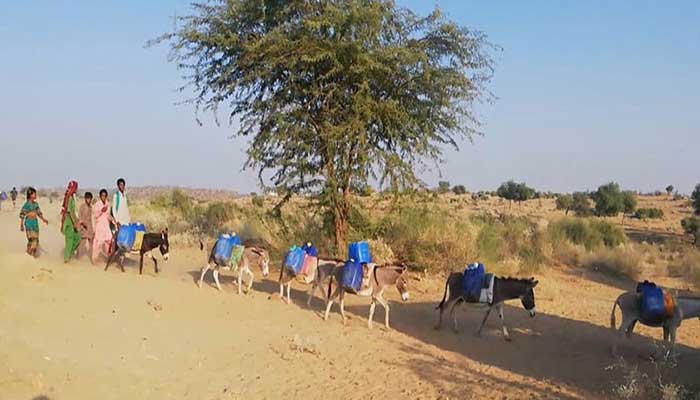Lockdowns: Saving lives, but ruining livelihoods in Thar
COVID-19 has created problems for a district that is already prone to drought, other natural vulnerabilities
HYDERABAD: A large number of workforce belonging to Thar Desert, who worked in urban centres have returned back home after lockdown, are facing hardships to feed their families.
An assessment carried out by the Thardeep Rural Development Programme (TRDP) showed that most of the workers were associated with garment and other factories with a small number of unskilled workers, who were struggling for survival as all business activities in urban and rural areas have been closed.
Many of these workers were sole bread winners in their family. Apart from this, daily wage earners in remote desert villages have also lost their source of income due to Covid-19 restrictions. Tharparkar district is already prone to drought and other natural vulnerabilities due to its arid status.
Wahid Dino, a daily wage earner from desert village Modore was among a number of youth, who used to earn Rs300-Rs400/day. Since the imposition of the lockdown, he is jobless.
People have small number of animals, mainly goats for survival. The village comprises of around 200 households, mostly dependent on rain-fed agriculture and livestock rearing.
Abdul Karim, another community activist from Bhojakar village in the neighbourhood, told The News that eight workers, associated with garment factories in Karachi have returned back, after closure of business activities.
Karo Bheel, also a worker from village Katho Bheel, said he used to cut trees for supplying to charcoal manufacturing units nearby, earning Rs250-Rs300/day by selling wood at Rs50/maund. But now the charcoal-making units have also been shutdown, leaving them in a vulnerable situation.
These workers in urban areas used to earn and feed their poor families back home in difficult times. Thus, supply chains to rural areas of Tharparkar have severely been curtailed, the finding said.
Around 116,473 households have been affected by the current lockdown.
Of those who were surveyed, 35 percent were agriculture and livestock workers, 42 percent daily wagers, 15 percent enterprise shopkeepers, five percent services (barbers, tailors etc,) and two percent were those who had started business through interest-free loans.
Some people are trying to cope with the situation by selling their assets and taking loans from money lenders for survival, the report revealed.
Considering the results of the findings, TRDP has taken an initiative to extend support to the community residing in some parts of the desert.
The main purpose is to save natural assets like livestock with provision of fodder and food packs to the families.
Reports of monsoon clouds gathering on the horizon have also given hope to the local community, as many families also depend on rain-fed land for agriculture. At this time, farmers demand provision of seed for rain-fed agriculture and drenching for livestock for economic resilience, reports said.
TRDP CEO Dr Allahnawaz Samo said they have taken an initiative to revive the economy of Thar Desert.
He said May, June, and July were crucial in the desert as wells went dry and animals turned weaker due to shortage of fodder and water, both.
He said TRDP had decided to provide seeds for both food and cash crops, like pearl millet, guar, and moth bean, to enable the community to take advantage of the upcoming monsoon rains.
Dr Samo, who has wide knowledge about desert ecology and changing scenario, believes that in case the farmers have bumper food and cash crops, they would be secure for a year, as they saved food and sold the cash crop to buy other essentials and fodder.
“However, if they do not have seeds, they may face hardships throughout the year,” he added.
Herdsmen migrating to canal areas usually return back in October and face hardship in finding fodder for their animals. “Besides giving seeds, we are also providing fodder and medicines to the herders to save their animals,” he said, adding that if this support was not provided, herders would end up selling animals for survival. Some poor families also end up getting stuck with local loan sharks, who charge them high interest rate for buying seeds from dealers. In return, they provide their products to these traders at low rates.
Around 20,000 families are being supported. Of these, 90 percent will get seeds, 70 percent fodder and de-worming vaccination, while 30 percent families being poor will get food packs to stay safe.
-
 Blake Lively Gushes Over Ryan Reynolds Amid Feud With BFF Taylor Swift
Blake Lively Gushes Over Ryan Reynolds Amid Feud With BFF Taylor Swift -
 Prince William 'furious' At Meghan Markle, Harry
Prince William 'furious' At Meghan Markle, Harry -
 Church Under Investigation After Anti-ICE Protest Interrupts Worship
Church Under Investigation After Anti-ICE Protest Interrupts Worship -
 UK Govt Tightens School Rules On Phones And Social Media
UK Govt Tightens School Rules On Phones And Social Media -
 Fernando Mendoza’s Mom Steals Hearts After Indiana Wins National Championship
Fernando Mendoza’s Mom Steals Hearts After Indiana Wins National Championship -
 'I Don't Care': Trump Shrugs Off Nobel Prize Talk As Greenland Tensions Escalate
'I Don't Care': Trump Shrugs Off Nobel Prize Talk As Greenland Tensions Escalate -
 King Charles Risks Facing Backlash As His Punishment Not Enough For Andrew
King Charles Risks Facing Backlash As His Punishment Not Enough For Andrew -
 Canucks Losing Streak Reaches 11 Games After Islanders Defeat
Canucks Losing Streak Reaches 11 Games After Islanders Defeat -
 'Industry' Creators Reveal Most Common Message They Get From Fans In Finance
'Industry' Creators Reveal Most Common Message They Get From Fans In Finance -
 Alarming: Rising Shark Attacks Force Australia To Close Beaches
Alarming: Rising Shark Attacks Force Australia To Close Beaches -
 Lily Allen Takes Side In Brooklyn, Nicola's Feud With David, Victoria Beckham
Lily Allen Takes Side In Brooklyn, Nicola's Feud With David, Victoria Beckham -
 Northern Lights Glow Across US, UK , Europe After ‘rare’ Solar Storm Hits
Northern Lights Glow Across US, UK , Europe After ‘rare’ Solar Storm Hits -
 Karol G Parts Ways With Beau Feid After Three Years Of Dating
Karol G Parts Ways With Beau Feid After Three Years Of Dating -
 'DWTS' Pro Gleb Savchenko's Mystery Love Interest's Identity Revealed
'DWTS' Pro Gleb Savchenko's Mystery Love Interest's Identity Revealed -
 Meghan Markle’s Father ‘plans To Leak’ Her Letter Despite Privacy Efforts?
Meghan Markle’s Father ‘plans To Leak’ Her Letter Despite Privacy Efforts? -
 Woody Harrelson Reveals Creative Clash With Matthew McConaughey On 'True Detective'
Woody Harrelson Reveals Creative Clash With Matthew McConaughey On 'True Detective'




